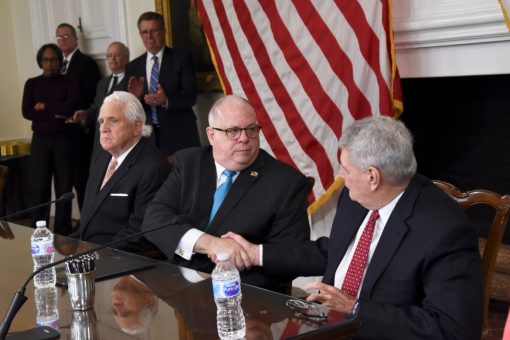
Maryland Gov. Larry Hogan, center, stands between Senate President Thomas V. Mike Miller Jr., left, and House Speaker Michael E. Busch, who each preside over Democratic supermajorities in their chambers.
By Reform Sasscer Staff
In what appears to be just side shows and theatrics to keep the public hopeful, it seems there is nothing like proper funding for the less fortunate Districts or fighting corruption in the state of Maryland. Many of us who have been following the activities of the current Maryland leadership must be crazy to imagine a corrupt government can investigate and prosecute itself.
With No Kirwan school funding this year, prolly not the next year, either. Many of us do not think we will see proper or meaningful transformation or hear anything about the funding before 2020, stated a concerned citizen on facebook as part of discussion. “The idea seems to want to prejudice the commission through unnecessary delays and interference,” the statement continued. Our fears as predicted on our December 14th article, shows a crafted plans to undermine the commission through politics of deception. There are fears, that, the findings will be watered down to suit a particular narrative and avoid the fines the state owes other jurisdictions such as Baltimore City or Prince George’s County. The timing and hiring of Dr. Alvin Thornton as Board of Education Chair in Prince George’s County connected to these issues and who is in a position to say something and has failed to issue a press release concerning the suspicious activities of Governor Larry Hogan, raises eye brows.
The joke is on the people who continue to blindly vote the corrupt leadership and sustain them in office at the expense of the larger population in Maryland. There is no excuse why children in Baltimore City and parts of Prince George’s County should have cold classes in the winter. There is no excuse why there is no independent state wide office not controlled by the Governor to tackle corruption heads on.
‘The Mike Busch, House speaker and Mike Miller, Senate president told the Kirwan Commission on Innovation and Excellence in Education in a letter (see below) that there was not enough time for the legislature to take up both its policy changes and its funding decisions in the 90-day session that starts in three weeks.’
We reprint the report by MarylandReporter.com below:

At a bill signing earlier this year, Gov. Larry Hogan shakes hands with House Speaker Michael Busch, as he did with Senate President Mike Miller at the table. Governor’s Office photo
By Len Lazarick
The most expensive and most controversial issue facing the new legislature — increasing the formulas for school funding — has been shelved for another year.
The House speaker and Senate president told the Kirwan Commission on Innovation and Excellence in Education in a letter that there was not enough time for the legislature to take up both its policy changes and its funding decisions in the 90-day session that starts in three weeks.
That’s because the commission hasn’t fully determined how much its broad recommendations for education reform will cost, which state and county taxpayers will foot the bill, and where the money will come from.
The commission missed its first deadline to complete its work a year ago. The legislature gave it another year. Now it will be given another nine months to finish what it has really only begun to tackle in the last few weeks.
The 2016 legislation creating the commission gave it more than 17 tasks to perform, some very broad and some very specific, but almost half of them related to funding.
Focused on broader issues
Instead, through the guidance of Commission Chair Brit Kirwan, former chancellor of the University System of Maryland, the commission spent a good deal of its time focusing on just one of those tasks — “to determine how the State can better prepare students to be competitive in the workforce and with other high performing countries in the global economy.”
That lead the commissioners to spend considerable time and money on consultants from the National Center on Education and the Economy that had done extensive research on what “other high performing countries” had done with their schools.
The commission also studied how Massachusetts had improved its school systems in the 1990s. Massachusetts students, and those in the other countries, consistently outperform Maryland students on tests. Kirwan and its consultants never bought the idea that Maryland schools were No. 1 in the country.
This led them to a complete revamping of how teachers in Maryland are recruited, trained and employed, including a new career ladder with higher pay, reduced class time and more certification to achieve promotion.
None of this is mentioned in the legislature’s directives to the commission. The last of its 17 tasks does include a broad charge “to make any other recommendations on legislation and policy initiatives to enhance the availability of innovative educational opportunities and to enhance the adequacy and equity of State funding for prekindergarten through grade 12 public education in the State.”
The commission did spend considerable time and effort on other of its assigned tasks:
- expanding pre-kindergarten — mentioned twice among its tasks;
- improving career and technical education, the subject of one of its five work groups;
- improving outcomes in schools with high concentrations of poverty and how to identify these students.
But only in the last two months has it begun to tackle “funding”– a term mentioned 10 times among its 17 tasks, and an issue that has already become contentious as the commissioners argued among themselves. (Story continues below.)
Funding at top of the list
Everybody knew the proposals would be expensive. In fact, the commission’s task at the top of its to-do list was to review the findings and recommendations of a consultants’ report that found Maryland public schools needed $2.9 billion more to achieve adequate funding in 2015. (The consultants were paid $1 million to come up with that finding.)
That was just to keep up with what the schools were already doing, not to make the vast changes in delivery and performance the Kirwan Commission envisions.
When they finally came up with $4.4 billion figure two weeks ago, everybody began to take notice, including Gov. Larry Hogan. He said that was way too much money and he wasn’t going to raise taxes to pay for it. Instead he wants to spend the casino gambling money that voters put into a lockbox on new and renovated school buildings — another huge unmet need that another legislative commission had identified two years ago. Overcrowded schools are an issue across the state, and not part of the Kirwan commission’s charge.
No appetite for raising taxes
Senate President Mike Miller and House Speaker Michael Busch blamed Hogan for not buying into the commission’s recommendations. But Sen. Paul Pinsky, a commission member and incoming chair of the Senate education committee, said on Tuesday, “there is no consensus for an increase in revenues this session.” He said it with some regret because he is one of the legislature’s strongest supporters of increased funding for schools and the teaching profession.
What Pinsky added was a dose of political reality to what in many cases has been a high-level discussion of what is best for all students, including students from high poverty, students with disabilities and students who wanted careers without a college education.
Miller and Busch were adding their own dose of political reality. As ambitious and forward-looking as the recommendations of the commission are, the legislators will be asking what they will cost and who will pay for them. There is little doubt that some jurisdictions will get more than others, and other jurisdictions will pay more than others.
Legislative leaders would like to get those details hashed out by next fall — they had hoped it would happen sooner — not in the midst of a new session with a third of the legislators new.
Teachers, school boards and superintendents already were harping on $2.9 billion in inadequate funding. They are understandably disappointed. But the reality is that the commission faced a hard sell for some of its proposals, particularly the changes involving teachers — hiring more of them when it was already hard to fill those jobs — giving them higher pay, fewer class hours but larger class sizes.
Even the widely popular extension of school for 3- and 4-year-olds and expanded career and technical education must have fiscal notes saying how much they will cost and where the money will come from.
The commission is still wrestling with how to keep the 24 local school systems accountable. While it adopted many of the best practices of high performing schools in other countries, the commission never considered embracing a common feature they also have — strong centralized control and funding. That contrasts with Maryland’s layers of divided responsibility between local school boards and superintendents, county government funders, the state school board and education department, the legislature and the governor.
***










 By:
By: 










 We are deeply thankful for your support and commitment to Reforms in Prince George’s County and Maryland in 2018. We look forward to working with you in 2019.
We are deeply thankful for your support and commitment to Reforms in Prince George’s County and Maryland in 2018. We look forward to working with you in 2019.











